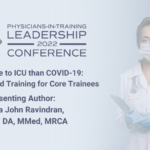Abstract | April 6, 2022
There’s more to ICU than COVID-19: Simulation based training for core trainees
Learning Objectives
- Identify common ICU scenarios that may be required to reintroduced to junior trainees who may have very little experience due to COVID and use simulation to demonstrate management and knowledge required for these scenarios.
Background: The COVID-19 pandemic saw many anaesthetic trainees, regardless of their level of training, being redeployed to assist in Intensive Care Units (ICU). This has skewed the first ICU exposure for the Core Trainees (CT1/CT2) who completed their ICU module requirements with limited exposure to the pre-pandemic regular mix of ICU cases.
Methods: To circumvent this issue, the Critical Care and Outreach Team in our hospital ran a day long ICU Simulation Course in our District General Hospital (DGH) utilising the high-fidelity mannequins in our Educational Simulation (SIM) Suite. Tailoring the scenarios to the most common cases seen in our DGH ICU, we targeted the difficulty level for core trainees, who formed teams of two for each scenario followed by a ‘Bubble Debrief’ session. A COVID-19 based scenario was an obvious choice, incorporating the recent change in management guidelines. A major, upper gastrointestinal haemorrhage scenario, targeted the knowledge of dealing with unstable physiology along with logistics of a “major haemorrhage” priority call and was well received. A head injury scenario, focussing on cerebral protection measures and preparation for transfer to a tertiary centre was followed by a scenario on cardiogenic shock ending with a discussion on appropriate choice of inotropic drugs along with cardiac output monitoring used in our unit.
Results: The anonymous feedback collected via Google forms underlined that the participants were equally appreciative of the clinical and non-clinical aspects of the scenarios such as team and resource management, leadership and communication. The trainees were also keen to repeat a similar course in the future, with the addition of different clinical scenarios alongside further lectures.
Conclusions: The effect of the pandemic on the core trainee ICU experience is something that has affected many hospitals, with trainees needing to be reintroduced to non-COVID-19 clinical scenarios commonly encountered on ICU. We feel that the simulation format used within this course was an effective and immersive way of achieving that goal. We aim to expand this course to other district general hospitals within the region and have been encouraged greatly by the learning outcomes and positive feedback.

